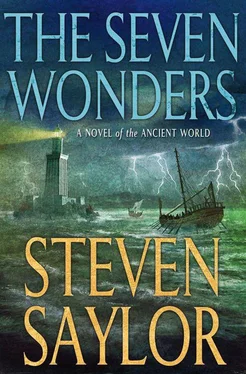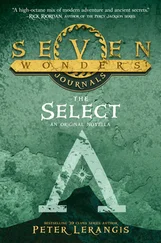Steven Saylor - The Seven Wonders
Здесь есть возможность читать онлайн «Steven Saylor - The Seven Wonders» весь текст электронной книги совершенно бесплатно (целиком полную версию без сокращений). В некоторых случаях можно слушать аудио, скачать через торрент в формате fb2 и присутствует краткое содержание. Год выпуска: 2012, Издательство: Macmillan, Жанр: Исторический детектив, на английском языке. Описание произведения, (предисловие) а так же отзывы посетителей доступны на портале библиотеки ЛибКат.
- Название:The Seven Wonders
- Автор:
- Издательство:Macmillan
- Жанр:
- Год:2012
- ISBN:нет данных
- Рейтинг книги:4 / 5. Голосов: 1
-
Избранное:Добавить в избранное
- Отзывы:
-
Ваша оценка:
- 80
- 1
- 2
- 3
- 4
- 5
The Seven Wonders: краткое содержание, описание и аннотация
Предлагаем к чтению аннотацию, описание, краткое содержание или предисловие (зависит от того, что написал сам автор книги «The Seven Wonders»). Если вы не нашли необходимую информацию о книге — напишите в комментариях, мы постараемся отыскать её.
The Seven Wonders — читать онлайн бесплатно полную книгу (весь текст) целиком
Ниже представлен текст книги, разбитый по страницам. Система сохранения места последней прочитанной страницы, позволяет с удобством читать онлайн бесплатно книгу «The Seven Wonders», без необходимости каждый раз заново искать на чём Вы остановились. Поставьте закладку, и сможете в любой момент перейти на страницу, на которой закончили чтение.
Интервал:
Закладка:
His brawny arms were left bare by the peculiar garment he wore, a sort of leather tunic closed by laces in the front; it was so short that when he yawned and stretched, his midriff was exposed. His bottom half was covered by a garment called bracae, or breeches, made of supple leather that fitted him like a second skin around his hips and wrapped separately around each leg, reaching all the way to his ankles, with a sort of pouch where all the seams converged. How a man could wear something so constraining around his private parts, I could not imagine.
Like Gatamandix, he wore odd-looking sandals decorated with tassels and beads. His toes, flecked with golden hair, were uncommonly large.
The conversation was about travel-Posidonius’s travels in Gaul, and the Gauls’ travels to Greece, with observations about differences between the two cultures. Antipater occasionally had something to say, but I was mostly silent, as was Vindovix. Nor did Cleobulus say much. The young scholar seemed to be in a sour mood, and not overly fond of the Gauls.
All through the meal, I felt that our host was observing us with a peculiar and inexplicable intensity. I noticed that his eyes repeatedly traveled from Antipater and me to Vindovix and back, as if he expected us to react in some way to the young Gaul’s presence. At last, over a dish of squid in aniseed sauce, Posidonius could contain himself no longer.
“Zoticus-Gordianus-when you look at Vindovix, what do you see?”
Antipater tilted his head. “He’s a very handsome young man.”
Posidonius nodded. “His fellow Gauls would certainly say so. But would you not agree that his features are a bit-‘strong,’ shall we say, by Greek standards?”
Antipater shrugged. “Ideals of beauty differ from place to place. The young man is certainly fit. And very large.”
“Fit? He has the physique of a god!” declared Posidonius. “As for his size, I’ll grant that he’s bigger than any Greek I know, but he’s actually a bit under average for a Gaul. What did Aristotle say? ‘Beauty resides in a big body; small men may be graceful and well-proportioned, but not beautiful.’ Bad news for us Greeks, eh, Cleobulus?” Posidonius laughed, but his pupil did not. “Yes, Vindovix is a robust specimen, by any standards. But is there nothing else you see when you observe him, Zoticus? No? What about you, Gordianus?”
I wrinkled my brow. “Now that you mention it, he does look a bit familiar, somehow.”
“Does he, indeed? And where might you have seen him before?”
“I can’t imagine. I’ve certainly never been to Gaul. And I don’t suppose you’ve ever been to Rome, have you, Vindovix?”
The Gaul smiled, flashing perfectly white teeth. His eyes were half-shut, as if he were still waking up. His accent was thick and his grammar a bit stilted, but then, so was mine when I spoke Greek, though I liked to think I was getting better. “No, Gordianus, never have I been to Rome.” With a forefinger and thumb he slowly stroked the tips of his moustache. “If I should come, will you let me sleep with you?”
I laughed. “ Stay with me, I think you mean. Of course.”
Posidonius cleared his throat. “Now think, Gordianus,” he said. “Look at Vindovix’s face, and tell me if it reminds you of anything-perhaps something you’ve seen quite recently, here in Rhodes.”
“Well…” I stared openly at Vindovix, and was a little unnerved at the way he stared back at me, smiling, with his eyes half-shut. “He does look a bit like … but it’s hard to say, because of the moustache.…”
Posidonius raised an eyebrow. “It’s as I’ve told you, Vindovix, you’ll have to shave that thing if you want anyone to see the resemblance.”
The young Gaul sighed. “Vindovix without his moustache-hard to imagine. So many girls back in Gaul would weep if they should hear of such a thing. But very well-perhaps I shave it off tomorrow. You will help me, Cleobulus?” He looked sidelong at the little Rhodian.
Cleobulus made a face. “I am not a barber,” he said. “We have slaves to do that sort of thing.”
Vindovix laughed softly. He seemed to enjoy teasing Cleobulus. “Or maybe, if I just cover my mouth with one hand, like this, and lean to one side, and turn my face away a bit…”
Vindovix stared at me with one pale blue eye, and suddenly I was seeing the face of the Colossus as I first glimpsed it when I sailed into the harbor, with its one eye staring back at me.
“Uncanny!” I whispered.
Antipater leaned forward, his brow furrowed. “He has the face of the Colossus! How can that be?”
Cleobulus grimaced and shook his head. “Ridiculous,” the young Rhodian muttered. “They’re not the least bit alike.”
But our host was pleased. He clapped his hands and laughed.
“Posidonius, please explain,” said Antipater.
“Very well. Now that my little experiment is concluded, I will share the tale. When I was staying with Gatamandix in Gaul, he often asked about the other places I had seen in my travels, and about my home in Rhodes. I was the first Greek who had ever visited the tribe, you see, and none of them had ever traveled beyond Gaul. Imagine my surprise when, as I began to describe to him the landmark for which Rhodes is most famous, it turned out that he knew about the Colossus already. He even knew that it was called the Colossus, and the fact that it represented the sun god. About some things he was mistaken-he didn’t know the Colossus had fallen, for example, and he had a rather exaggerated idea of its actual height, thinking it literally bestrode the harbor, with a foot on each side; well, no statue could be that large. But such garbled details invariably occur when a tale travels a great distance. What amazed me was that he knew anything about the Colossus at all.”
“How had he heard of it?” said Antipater.
“Perhaps I should allow Gatamandix himself to explain.”
The Druid nodded. “As I told Posidonius, the existence of the great Colossus has been known among the Segurovi for many generations-because it was an ancestor of Vindovix who posed for the statue.”
My jaw dropped. I stared at Vindovix, who laughed and slapped his leather-clad knee. “Yes, it was my great-great-great-great-grandfather. He also was named Vindovix.”
“But how is such a thing possible?” I said.
“It’s not, ” said Cleobulus, clenching his teeth. “At the time the Colossus was made, no Gaul had ever set foot in Rhodes.”
“Actually,” said Posidonius, “it is just possible. The fact is, the Gauls first became known to most Greeks when a Gallic chieftain called Cimbaules made an incursion against the Macedonians, a little over two hundred years ago-at exactly the time when Chares began working on the Colossus.”
“I thought the Gauls first invaded Greece some twenty years later than that, when they swept all the way down to Delphi,” said Antipater.
“That was the second Gallic incursion,” said Posidonius. “Everyone’s heard of it, because the Gauls caused so much terror and destruction. But there was an earlier invasion-or attempted invasion, I should say, because Cimbaules was soundly repelled by the Macedonians and never reached the Aegean Sea.”
“And was this Cimbaules of the same tribe as Gatamandix and Vindovix?” said Antipater.
“As a matter of fact, he was not,” said Gatamandix. “But among his warriors it seems there was at least one Segurovi, called Vindovix. And when Cimbaules was defeated, this Vindovix was captured and made a slave-”
“But he didn’t die a slave,” said Vindovix. “He was still young and strong when he returned to Gaul-young enough to marry and have a son, my great-great-great-grandfather. That Vindovix had many stories to tell of his time among the Greeks, stories that were passed down from generation to generation, until my father told them to me. The most amazing of those stories was about his time on a great island that he called Rodos, where a maker of statues used him as the model for the most gigantic statue ever made, which the Greeks called the Colosso . For many days he was made to stand naked, with a crown of sunbeams on his head and a torch in one hand, while the sculptor made a small version of the statue, which was then used to make the big one. My ancestor never forgot the day the Colosso was dedicated, and he saw his own image tower above the people of Rodos . He realized then and there that he was never meant to be a slave, so he jumped in the water, swam to the mainland, and fought his way home to Gaul.”
Читать дальшеИнтервал:
Закладка:
Похожие книги на «The Seven Wonders»
Представляем Вашему вниманию похожие книги на «The Seven Wonders» списком для выбора. Мы отобрали схожую по названию и смыслу литературу в надежде предоставить читателям больше вариантов отыскать новые, интересные, ещё непрочитанные произведения.
Обсуждение, отзывы о книге «The Seven Wonders» и просто собственные мнения читателей. Оставьте ваши комментарии, напишите, что Вы думаете о произведении, его смысле или главных героях. Укажите что конкретно понравилось, а что нет, и почему Вы так считаете.










